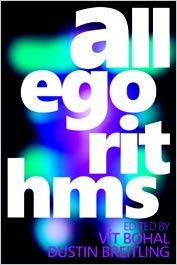Embodiment, Incorporation and Affect: Reflecting on the Interface
In Vit Bohal and Dustin Breitling (Eds.) Allegorithms. Prague: Centre for Critical and Cultural Theory, 2017.

Computational interfaces have a strong tendency to embody a whole set of personal, cultural and social notions; and they do so in rarely overt ways. Which forms of embodiment are normalised through particular interfaces? As philosopher Gail Weiss notes, via Young and Butler, human bodies are ‘marked’ by racial, sexual, age, ethnic, class, moral, and technological differences; and these must be taken into consideration to understand the difference and richness of distinct modes of embodiment as they emerge from our use of computational interfaces. Interfaces themselves may not have a gender, but they definitely do encourage gendered ways of thinking and techniques of problem solving.